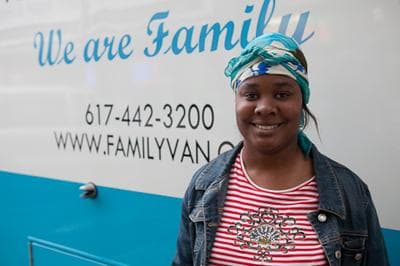Advertisement
Study: Mobile Clinic Saves Money, Improves Health For Low-Income Patients
The Boston "Family Van" is an urban mobile health clinic that travels to some of the city's poorest, medically underserved communities — Dorchester, Roxbury, East Boston, Hyde Park and Mattapan — caring for patients who have the highest rates of preventable illness, hospitalizations and avoidable emergency department visits. (Not surprisingly, these are also some of the neighborhoods hardest hit by the current flu epidemic.)

A recent study, published in the journal Health Affairs, found that the Family Van — with its neighborhood version of house calls — also saves money by preventing ER visits. Additionally, patients receiving care from The Van staff were able to reduce their blood pressure, researchers report.
The study, by researchers at Harvard Medical School, looked at data from 5,900 patients who made a total of 10,509 visits between 2010 and 2012.
Here's more from the paper:
"The average reductions in systolic and diastolic blood pressure were associated with a 31.0 percent and a 33.3 percent reduction, respectively, in the relative risk of myocardial infarction.
Similarly, the blood pressure reductions were associated with a 40.4 percent and a 48.8 percent reduction, respectively, in the relative risk of stroke. Following the literature, we averaged the systolic and diastolic effects to arrive at an overall relative risk reduction of 32.2 percent in myocardial infarction and 44.6 percent in stroke associated with the blood pressure reductions...
In a population ages 55–64 that is evenly divided among men and women, the incidence of myocardial infarction is estimated to be about 11.4 per 1,000 person-years, and the incidence of stroke about 3.3 per 1,000 person-years. Using average attributable costs per case, the reductions in incidence were estimated to have saved $235,254 from blood pressure reductions over the thirty-six-month study period.
With each avoidable emergency department visit costing on average $474 in Massachusetts, we estimated total savings of about $1.4 million from the 2,851 reported emergency department visits avoided. These savings were much larger than the savings from blood pressure reduction. Thus, estimated savings from the use of mobile clinics were driven by the number of emergency department visits avoided.
Total mobile clinic savings were about $1.6 million from January 2010 through June 2012. Total operating expenditures during the same period were $1,222,886. Operating expenses included personnel salaries and benefits, vehicle operations and utilities costs, and mobile clinic administrative costs. The ratio of total savings to total expenditures, or return on investment, was thus 1.3."
This program aired on January 15, 2013. The audio for this program is not available.
